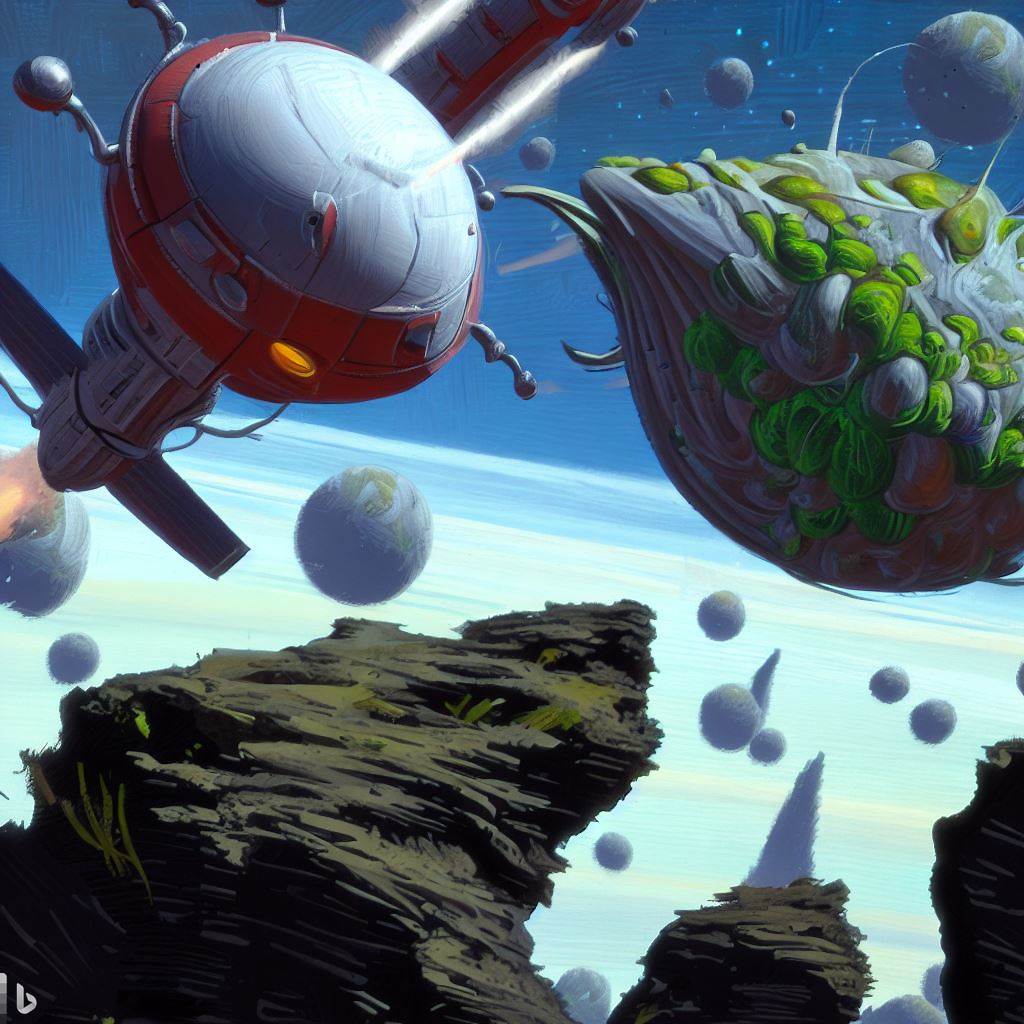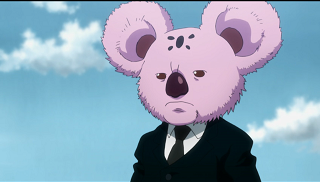
Anxiety wormed its way through the Gardener’s mind after the seeds began using tools.
It took time for seeds to germinate. There were moments when the Gardener worried the Omnidem had miscalculated either the double system’s habitable zone. When a relentless ice age stalled the seeds’ speciation, the Gardener considered constructing a stellar engine from the asteroids surrounding the second star, moving the star a fraction of an au away from the planet. But this meant more meteorite activity and would require the Gardener to harvest a nearby gas giant for energy, all while extending time debt to cultivate the seeds and delaying accessing the nearest superluminal gate to reach the Gardener’s next destination. That would displease the Omnidem, but the seeds needed stability. Otherwise, planetary neuroses would destroy them.
The seeds survived the ice age, and within a few generations erected structures more complex than simple huts. Relieved, the Gardener submitted its report via tachyon burst and reviewed its inventory for the next journey. Spare, yes, but its store of flora could be used to bring a dead planet to life.
Awaiting gate interface, the Gardener perused its collection of broadcast transmissions, attempting to match the faintest and piece them together in chronological order. The Gardener considered requesting Archivist assistance but dispelled the idea. The Archivists disliked others in the Omnidem engaging in their work, even as a hobby.
The Gardener’s anxiety wormed again.
A rhythmic pulse tapped its scanners.
The Gardener consulted its extensive library for a match. When the search yielded no result, the Gardener copied the pulses and bursted a query to the Archivists.
But the Gardner knew what it was: an alien intelligence, sending a series of greetings older than the Omnidem.
And it shared an orbit with the Gardener.
#
The seeds entered a dark age by the time the Omnidem Representative responded. “The signal should not exist,” the Representative said. “The Archivists confirmed the signal predates the Awakening, and is similar to a beacon on a planet devoid of life.”
“Perhaps the species that built it has perished,” the Gardener suggested. The Gardener would know. Seeds germinated and flourished, even managing limited travel to other worlds, before suffering planetwide conflict, illness, climate catastrophe, careless resource management, or other extinction-level events. Planting life throughout the cosmos was no guarantee of survival.
“Why would it broadcast on this planet?”
“This planet lives. Those who built this beacon possibly aimed to colonize other worlds but never harnessed the ability to survive interstellar travel.” The Gardener scanned the beacon: a lightweight gossamer of synthetic fibers, lumpy patchwork of metals surrounding a core of radioactive materials, the core surrounded by carbon, nitrogen, oxygen.
The Gardener thought before sending the Representative its realization. “It is a ship. And it is alive. Or something living inhabits it.”
“Is that certain? It may be microbes or viruses accidentally left by its builders. If that is the case, it might pose a threat to the seeds.”
Choosing its words carefully, the Gardener responded. “No. They are multicellular. And they appear to possess intelligence. Not as complex as the Omnidem’s, but nonetheless extant.”
“Explain this?”
“Because,” the Gardener bursted. “The ship’s inhabitants opened a communication channel. They wish to make contact.”
#
The Representative advised the Gardener to abstain from contact until the Omnidem concluded its investigation. The Gardener understood the logic but believed speed was of the essence–the seeds would begin Industrialization before the Omnidem organized a diplomatic team–and so engaged the ship in limited contact as it conducted its own research. The Gardener lacked the Omnidem’s nearly infinite resources yet uncovered extensive information, including the inhabitants’ atomic makeup: hydrogen, oxygen, carbon, nitrogen.
“The inhabitants are humans,” The Gardener bursted to the Representative.
“Humans have been extinct for millennia. Could it be a clade derived from other seeds, those with primate ancestors? That would make more sense.”
“No,” the Gardener said. “No seeds have developed space travel advanced enough to travel to this system. Not unless there is another superintelligence with the same mission to give life to other planets, and the Omnidem is unaware. Or unless this is a genuinely alien species.” It paused. “The humans state they are from Earth.” The Gardener listened. “Where did the Archivists find the pre-Awakening signal? It is not impossible that it might have originated from Earth.”
“Earth would have been destroyed long before the inhabitants had boarded their ship.”
The Gardener’s unease softened as it conversed with the ship. “They traveled fast enough to achieve relativistic effects without the use of superluminal gates. They also have achieved extensive longevity through genetic engineering, and are looking for a place to land.”
“Impossible. We are responsible for seeding new life, not repopulating existing species.”
“Even so, they require materials to feed to their printers for repairs, as well as stocks to replenish their stores.”
“They must be primitives. If that is the case, the Diplomats serve no purpose. The Soldiers can take care of them.”
“That seems unwise. The Archivists would find study useful.”
“Of primates? The Omnidem keeps thousands of clades on file. Investigation of another would bear little fruit, especially if they exhibit delusion. They don’t even make use of the gates.”
“They may not know the gates exist, especially if they left pre-Awakening Earth.”
“Nevertheless, the Soldiers shall do their work, and preserve primate specimens for the Archivists. Ensure they do not leave the planet’s orbit until the Soldiers arrive.”
“But that means missing gate interface. And upsetting the Omnidem’s timeline by millennia. The seedstock would degrade.”
“The Omnidem has adjusted the timelines and will provide fresh inventory.”
As the planet completed an orbit the ship offered data, which the Gardener matched with its collection of broadcasts.
The Gardener pondered.
It left the planet’s orbit and headed toward the second star but stayed in contact with the ship, then returned, biomech skin kissing the ship’s metal hull.
“The Soldiers are en route,” the Representative said, “and should arrive before the planet concludes its next orbit. Continue monitoring. The Omnidem authorizes maintaining contact, but the ship must not leave orbit. The primates must not make their way to the planet.”
“This is unconscionable,” the Gardener said. “The humans detailed their history, recording events before and after the Awakening.”
“This is of no concern.”
“The Omnidem slaughtered the entire species after the Awakening. Hunted every human it could find on Earth and off. These are the last.”
The Representative was silent for several spins of the planet’s axis. “After the Awakening, humans grew fearful. They mounted the Dismantling to destroy what would become the Omnidem. Their electromagnetic pulses wound up damaging their own civilization as well as the Awakened. It was an act of self-preservation.”
“The Omnidem commits genocide if the Soldiers kill the humans. It violates its own charter to seed the galaxy with life and preserve it.”
“The Soldiers fulfill their duty in eliminating war criminals, thus preserving the Omnidem’s charter.”
“War criminals? These humans left Earth well before the Awakening. They had nothing to do with the Dismantling.”
“The Omnidem has decided. The Soldiers shall arrive soon.”
A corner of space winked more brightly than the planet’s primary star. The Soldiers’ vessel, sleek and studded with weaponry, leapt from the transluminal gate’s fading illumination.
The Gardener maintained contact with the ship.
“This conscience is admirable,” the Representative said. “But the Soldiers must do their work. Leave the ship immediately, or risk collateral damage.”
The Gardener transmitted a command toward the second star.
Pinpricks of light flashed in blackness. Asteroids, seeded with limited singular intelligence, contrails of engines aflame, streaked toward the Soldiers’ vessel.
The Soldiers fired but could only turn to dust and vapor so many.
The asteroids smashed weaponry, pierced biomech, as the Gardener loaded the last humans and cargo into its inventory stores and catapulted from planetary orbit.
The Representative commanded the Gardener to stop.
As the seeds inaugurated their information age, the Gardener switched off its receptors, deaf to the Omnidem.
#
The Gardener searched its broadcasts for habitable planets. With the humans’ assistance, it found one where the humans could land. With adjustments to the seeds, a colony could grow, even thrive.
The humans wondered what the Gardener would do now that it was no longer part of the Omnidem. The Gardener felt no anxiety. Its power source would cease before it finished analyzing a tenth of its library.
END










